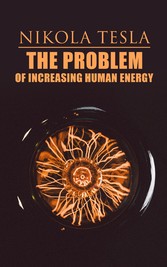The Problem of Increasing Human Energy - Philosophical Treatise (Including Tesla's Autobiography)
von: Nikola Tesla
e-artnow, 2020
ISBN: 4064066391928
, 109 Seiten
Format: ePUB
Kopierschutz: Wasserzeichen
Preis: 1,99 EUR
eBook anfordern 
Mehr zum Inhalt

The Problem of Increasing Human Energy - Philosophical Treatise (Including Tesla's Autobiography)
The Problem of Increasing Human Energy is an essay written by Nikola Tesla to honor his agreement with the editor of The Century Magazine to produce an article on his findings. In this essay Tesla explained the superiority of the wireless system he envisioned, but the article was more of a lengthy philosophical treatise than an understandable scientific description of his work. He contemplates on how a man should utilize his time and body, what makes a man productive in his highest capacity, and what increases man's 'energy' in the human capacity. Tesla approaches human potential energy from the physics perspective tying it to the mass, speed, and removal of retarding forces. When human civilization was just starting to impact the natural world, Tesla was already worrying about problems of overpopulating and running out unrenewable resources. He was not only pointing this out, but he was already working out the solutions.
Nikola Tesla (1856-1943) was a Serbian-American inventor, electrical engineer, mechanical engineer, and futurist best known for his contributions to the design of the modern alternating current (AC) electricity supply system. Attempting to develop inventions he could patent and market, Tesla conducted a range of experiments with mechanical oscillators/generators, electrical discharge tubes, and early X-ray imaging. He also built a wireless-controlled boat, one of the first ever exhibited. Tesla became well known as an inventor and demonstrated his achievements to celebrities and wealthy patrons at his lab, and was noted for his showmanship at public lectures.










